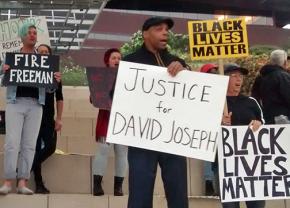David Joseph deserves justice
reports from Austin, Texas, on ongoing organizing to win justice for David Joseph, who was killed by an Austin police officer last month.
"APD, YOU can't hide. We charge you with genocide!" chanted some 50 activists gathered outside City Hall on March 10 as they demanded justice from the Austin Police Department for the murder of teenager David Joseph.
The 17-year-old was killed on February 8 by officer Geoffrey Freeman in the suburb of Pflugerville, just north of Austin. Joseph was unarmed and naked at the time of his murder. The APD has completed an internal investigation into Joseph's death, but has yet to release its findings.
Joseph's two surviving brothers, Fally and Mark Joseph, were ushered into the protest by members of the Austin Justice Coalition (AJC) and the Nation of Islam Austin, marking the first time that most people had seen members of Joseph's family. Chas Moore, an AJC organizer, urged the crowd to embrace the brothers and let them know why there were out demonstrating.
After a series of handshakes, hugs and words of solidarity, Juanita Spears, another AJC lead organizer, began a chant of "What are we going to tell Obama? All lives matter when Black lives matter!"--a reference to Obama's highly publicized visit to Austin during the South by Southwest music festival.

ACTIVISTS MARCHED through the rain to the location of a Citizen's Review Panel, where public comment on Joseph's case would be heard. The panel, which is tasked with making recommendations to the APD after an internal investigation has been completed, has come under criticism for being a "paper tiger" since Police Chief Art Acevedo is under no obligation to accept their recommendations.
The panel has also been criticized for its secrecy, since its recommendations aren't made public and can only be revealed later through an FOIA request.
AJC organizer Chas Moore addressed the panel, calling the public comment session "just a meeting for us to vent." A panel member replied that the public hearing was important, and that it was because of "community insistence" that the panel was reviewing the APD's investigation "a month after the incident occurred, rather than a year."
David Joseph's oldest brother, Fally, also addressed the panel. Fally, who is emerging as the voice of the movement for justice for his brother, told the audience that because of his brother's death, he had postponed his wedding. David was supposed to be the best man. He also shared with the audience that he no longer believed that his other brother was safe, and felt that he "had to call him every five minutes to see if he's okay."
Jamie Martin, a teacher and family friend, gave a moving presentation, talking about how David's mother was an immigrant from Haiti who left her country in 1994, the year of the U.S. invasion. Martin connected Joseph's case to those of other victims of the Austin police such as Byron Carter, Sophia King and Larry Jackson Jr.
Measure Austin representative Meme Styles delivered a statement developed by various local organizations. The statement connected Joseph's case to gentrification and "cultural violence" against Austin's Black and Chican@ communities, calling "Austin's renowned 'livability' a racist irony."
"We know who is welcomed by South by Southwest," Styles added, stating that the music festival existed for tech-sector oligarchs and wealthy tourists, not for Austin's working-class Black and Brown residents. She then presented a list of demands that included an indictment of Officer Freeman, the resignation of Austin police union president Ken Casaday and a renegotiation of the APD contract with the city, overseen by a Community Oversight Committee.
Questions remain whether these demands will be met or whether the Citizen's Review Panel will have any influence on the outcome of the case. Furthermore, there has still been no word from the district attorney's office on any criminal proceedings.
Activists will have to keep up the pressure--and working to connect police brutality to larger economic issues by protesting the city's famed music festival is a step in that direction.


